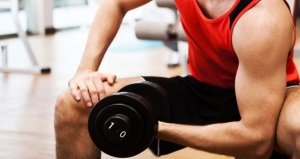Not just athletes, but anyone for that matter tend to over exercise. Some people think that the more you exercise, the better. However this is not necessarily true. The first effect of too much exercising is muscle pain. While lactic acid build-up has been blamed for producing muscle pain, it is actually the result of three things combined. Lactate, certain acids, and ATP. During muscle contraction, these substances are released causing pain and discomfort. Scientists at the University of Utah conducted a study of mice to show how too much exercising can cause pain. Researchers isolated the substances and injected them into mouse nerve cells. At first there was no response, but when all three substances were injected at the same time, many of the nerve cells responded. The neurons responded differently depending on how much of the substances were injected. The results were similar when they performed this on humans. When the substances were combined, the subjects reported pain, swelling, and fatigue. Therefore, “The accumulation of these substances is likely what causes your muscles to hit a wall, so to speak, when you exercise too much.”
While exercise is essential for good cardiovascular health, new research is finding that too much exercise can also increase the risk of a heart attack or stroke in patients with existing heart problems. The journal, “Heart,” published a new study that tracked a decade’s worth of exercise habits and survival of more than 1,000 people with diagnosed, but stable, coronary artery disease. “Surprisingly, those who did the most strenuous daily exercise were also more likely to die of a heart attack or stroke than people who engaged in more moderate activity.”
While of course exercising regularly is extremely beneficial to your body, you must be careful to not reach an excessive amount. There are some drawbacks with prolonged and high-intensity activities.Swedish researchers studied the physical activity of more than 44,000 men periodically over 12 years. “They found that those who exercised more than five hours per week were 19 percent more likely to develop irregular heart rhythm than those who exercised less often.”
Current medical recommendations call for heart-disease patients (like everyone else) to exercise five to seven days a week. What is shocking, is that this may actually be more detrimental than beneficial. One study followed 1,038 patients with heart disease for 10 years and found that “Those who vigorously exercised daily were more than twice as likely to die of a heart attack or stroke than those who exercised only two to four days a week.” Endurance exercise also increases the risk of atrial fibrillation. It is a cardiac arrhythmia that greatly increases the risk of stroke. These health risks come with consistent vigorous exercise. It is important to exercise and be active, but always know when to stop. 
Works Cited
http://www.healthline.com/health-news/why-too-much-exercise-can-be-bad-042514
http://www.cbsnews.com/news/too-much-exercise-may-be-bad-for-the-heart/
http://www.huffingtonpost.com/brad-stulberg/health-and-fitness_b_5622445.html
http://www.ajc.com/news/lifestyles/health/too-much-exercise-bad-your-health/nfxmX/#__federated=1
http://www.dailymail.co.uk/health/article-2511045/Getting-exercise-bad-getting-all.html
http://online.wsj.com/articles/SB10001424052702304908304579561802820076042




 Sugar after exercising has a negative affect on your body. It affects your insulin sensitivity and your human growth hormone production. Despite being referred to as “Energy drinks,” the sugar that they contain does just the opposite. After a quick burst of energy, your energy level drops as your pancreas and other glands try to balance out the toxic stimulation to your blood sugar. School of Public Health professor, Mary Story, says, “We’re seeing schools, parents, and community members making the decision to swap soda for sports drinks thinking they’re improving children’s consumption of sugary-sweetened beverages, but really, they’re replacing one sugary drink for another.”
Sugar after exercising has a negative affect on your body. It affects your insulin sensitivity and your human growth hormone production. Despite being referred to as “Energy drinks,” the sugar that they contain does just the opposite. After a quick burst of energy, your energy level drops as your pancreas and other glands try to balance out the toxic stimulation to your blood sugar. School of Public Health professor, Mary Story, says, “We’re seeing schools, parents, and community members making the decision to swap soda for sports drinks thinking they’re improving children’s consumption of sugary-sweetened beverages, but really, they’re replacing one sugary drink for another.”

